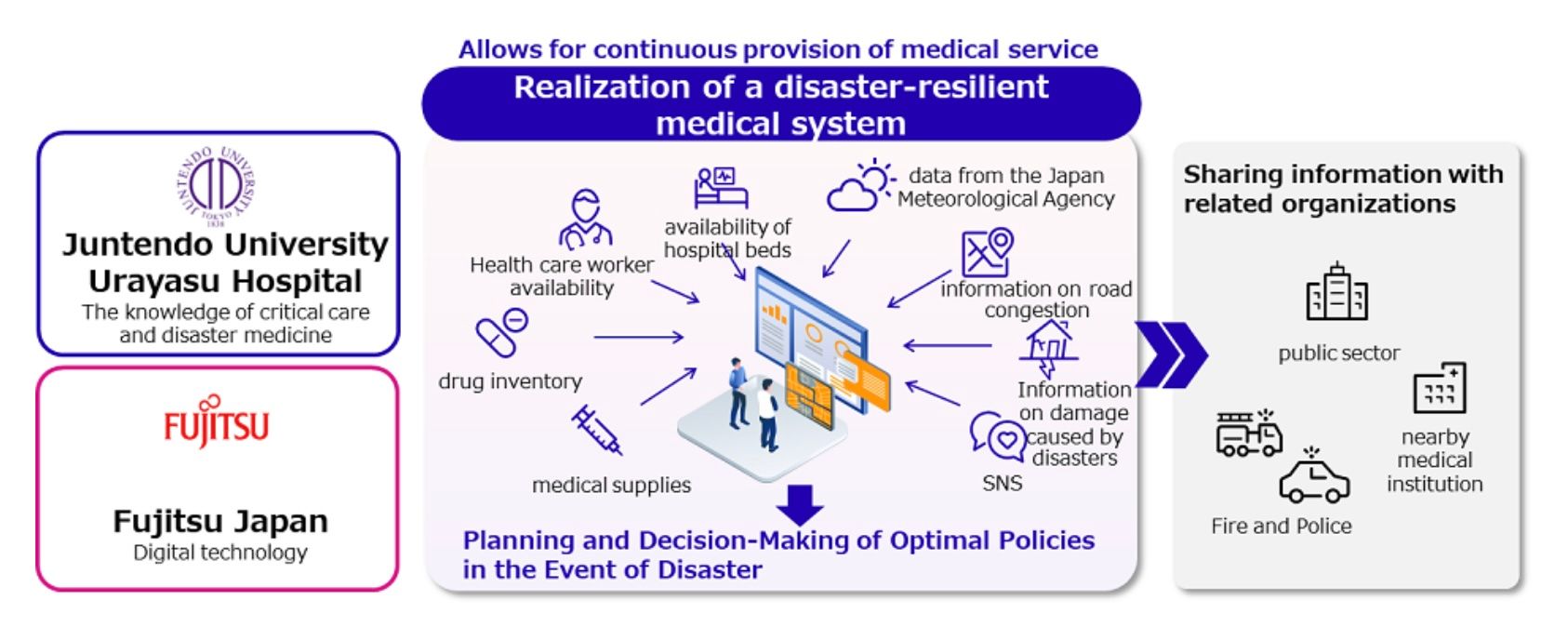Kawasaki and Tokyo, June 3, 2024 - (JCN Newswire) - Fujitsu Japan and Juntendo University today announced the launch of a “Medical Digital Resilience Research Course,” which focuses on the realization a resilient, disaster-ready medical system (1) that allows for continuous provision of medical services even in the event of a large-scale natural disaster or pandemic. This course will be implemented for 3 years starting in June 2024.
The course will combine the knowledge of critical care and disaster medicine at Juntendo University with Fujitsu Japan’s digital technology with the aim of building a framework for disaster-affected medical institutions to quickly collect and share information to aid recovery.
Fujitsu Japan and Juntendo University will specifically promote the development of technologies that support the collection of information to offer insights into conditions on disaster-afflicted areas, including data on traffic congestion and fires. This will allow medical personnel and local authorities to coordinate planning and make data-driven decisions, as well as make predictions of patient volume and material transport route optimization using tools like Fujitsu’s flood information prediction technology, and the operation simulation in normal times and disasters for hospitals, aiming at the social implementation of the research results.
Background
With heightened awareness around disaster-preparedness in the wake of the COVID-19 pandemic and natural disasters such as earthquakes, typhoons and floods, the establishment of business continuity plans for medical institutions has become an urgent priority in Japan, and efforts have been made to ensure that medical services can continue in roles appropriate to their size and function. However, when a large-scale disaster occurs, in the affected areas, information on medical needs such as the number of injured and sick people and the severity of these cases, as well as information on available medical resources, is currently difficult to manage during the acute stage of a disaster (2). Much of this information is managed using analog methods, and the collection of this data and coordination of logistics is done manually.
This poses a major challenge for medical institutions and frontline workers who may struggle to grasp in real time the quantity and quality of available medical resources as well as the level of demand, which can be extremely volatile in the aftermath of a major disaster.
Outline of the joint researchPeriodFrom June 1, 2024 to May 31, 2027Joint research title“Medical Digital Resilience Research Course”Person-in-charge: Professor Ken Okamoto, Director of Department of Emergency and Critical Care Medicine, Juntendo University Urayasu HospitalLocationJuntendo University Urayasu Hospital (Urayasu City, Chiba Prefecture)Research Contents(1) Consideration of the efficiency improvement of real-time collection and sharing of information necessary for disaster medicine(2) Visualization and appropriate arrangement of medical resources in disaster-stricken areas(3) Consideration of a system that can appropriately share the information within a hospital to other local, regional, and national medical institutionsRolesJuntendo University Urayasu Hospital:Provision of knowledge and medical resources (doctors, nurses etc.) in emergency response and disaster medicine, definition of system requirements, evaluation of system effectivenessFujitsu Japan:Collecion of medical and disaster information, prediction of optimal transport routes for supplies, provision of digital technology for simulation of hospital operation during a disaster and at normal times, system requirements analysys, design and coding

Future Plans
Juntendo University Urayasu Hospital protects the lives and health of patients by providing safe and high-quality medical care 24 hours a day and 365 days a year, promotes collaboration with local medical institutions, and manages medical care of patients as a university hospital. In addition, as a regional disaster base hospital, Juntendo University Urayasu Hospital will continue to play a key role in providing necessary medical care during the acute stage of disasters.
Fujitsu Japan supports local disaster medicine through DX and contributes to the realization of a more resilient, disaster-resilient society.
[1]Disaster medical system :A system that promptly provides medical care in the event of a disaster
[2]Acute stage of a disaster :This refers to the period from 72 hours to one week after the disaster occurs. It is the period between the occurrence of a disaster until the situation and damage is ascertained and a system for restoring lifelines and receiving human and material support is established, as well as until the unrescued sick and wounded can survive, and until isolated medical institutions receive external support.
About Fujitsu
Fujitsu’s purpose is to make the world more sustainable by building trust in society through innovation. As the digital transformation partner of choice for customers in over 100 countries, our 124,000 employees work to resolve some of the greatest challenges facing humanity. Our range of services and solutions draw on five key technologies: Computing, Networks, AI, Data & Security, and Converging Technologies, which we bring together to deliver sustainability transformation. Fujitsu Limited (TSE:6702) reported consolidated revenues of 3.7 trillion yen (US$26 billion) for the fiscal year ended March 31, 2024 and remains the top digital services company in Japan by market share. Find out more: www.fujitsu.com.
Press Contacts
Fujitsu Limited
Public and Investor Relations Division
Inquiries
Topic: Press release summary
Source: Fujitsu Ltd
Sectors: MedTech
http://www.acnnewswire.com
From the Asia Corporate News Network
Copyright © 2026 ACN Newswire. All rights reserved. A division of Asia Corporate News Network.
|